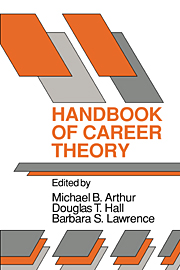Book contents
- Frontmatter
- Contents
- List of contributors
- Preface
- PART I CURRENT APPROACHES TO THE STUDY OF CAREERS
- Introduction to Part I
- 1 Generating new directions in career theory: the case for a transdisciplinary approach
- 2 Trait-factor theories: traditional cornerstone of career theory
- 3 Careers, identities, and institutions: the legacy of the Chicago School of Sociology
- 4 The utility of adult development theory in understanding career adjustment process
- 5 Developmental views of careers in organizations
- 6 Exploring women's development: implications for career theory, practice, and research
- 7 The influence of race on career dynamics: theory and research on minority career experiences
- 8 Asynchronism in dual-career and family linkages
- 9 Transitions, work histories, and careers
- 10 Career system profiles and strategic staffing
- PART II NEW IDEAS FOR THE STUDY OF CAREERS
- PART III FUTURE DIRECTIONS FOR THE DEVELOPMENT OF CAREER THEORY
- Name index
- Subject index
6 - Exploring women's development: implications for career theory, practice, and research
Published online by Cambridge University Press: 05 June 2012
- Frontmatter
- Contents
- List of contributors
- Preface
- PART I CURRENT APPROACHES TO THE STUDY OF CAREERS
- Introduction to Part I
- 1 Generating new directions in career theory: the case for a transdisciplinary approach
- 2 Trait-factor theories: traditional cornerstone of career theory
- 3 Careers, identities, and institutions: the legacy of the Chicago School of Sociology
- 4 The utility of adult development theory in understanding career adjustment process
- 5 Developmental views of careers in organizations
- 6 Exploring women's development: implications for career theory, practice, and research
- 7 The influence of race on career dynamics: theory and research on minority career experiences
- 8 Asynchronism in dual-career and family linkages
- 9 Transitions, work histories, and careers
- 10 Career system profiles and strategic staffing
- PART II NEW IDEAS FOR THE STUDY OF CAREERS
- PART III FUTURE DIRECTIONS FOR THE DEVELOPMENT OF CAREER THEORY
- Name index
- Subject index
Summary
Developmentally, women are different from men. The claim has surfaced so often, it can no longer be denied. Whether the charted gender differences have been framed as inherent female defects in biology (Freud, 1925), feminine deficiencies in reasoning (Kohlberg, 1976), learned responses to a political reality (French, 1985; Schaef, 1981), the recognition of a distinct developmental voice for men and women (Belenky, Clinchy, Goldberger, and Tarule, 1986; Gilligan, 1977), or cause for celebrating a new psychology of women (Miller, 1976), the theme is the same. Women construct their conceptions of themselves, their lives, and the world around them differently from men.
During the fragile early years of the Women's Movement, it was taboo to acknowledge any basic differences between men and women other than the most obvious biological ones. Equality between the sexes required a lock-step belief in what now seems a simplistic definition of equity as sameness. While we spoke of increasing human freedom by challenging stereotypic conceptions of men and women, we implicitly sold the male model of life and work as women's salvation from their second-class citizenship.
But the time has come to move beyond the debate of whether women and men are developmentally different and to focus more clearly on understanding the differences and their implications. Masking these developmental differences serves neither gender. We have begun to admit (Friedan, 1981; Marshall, Chapter 13) that the male model of work and success may be a dead end (and health statistics say that literally may be true).
- Type
- Chapter
- Information
- Handbook of Career Theory , pp. 110 - 132Publisher: Cambridge University PressPrint publication year: 1989
- 163
- Cited by



